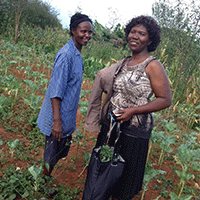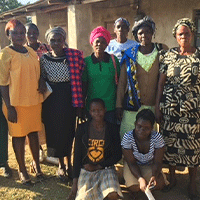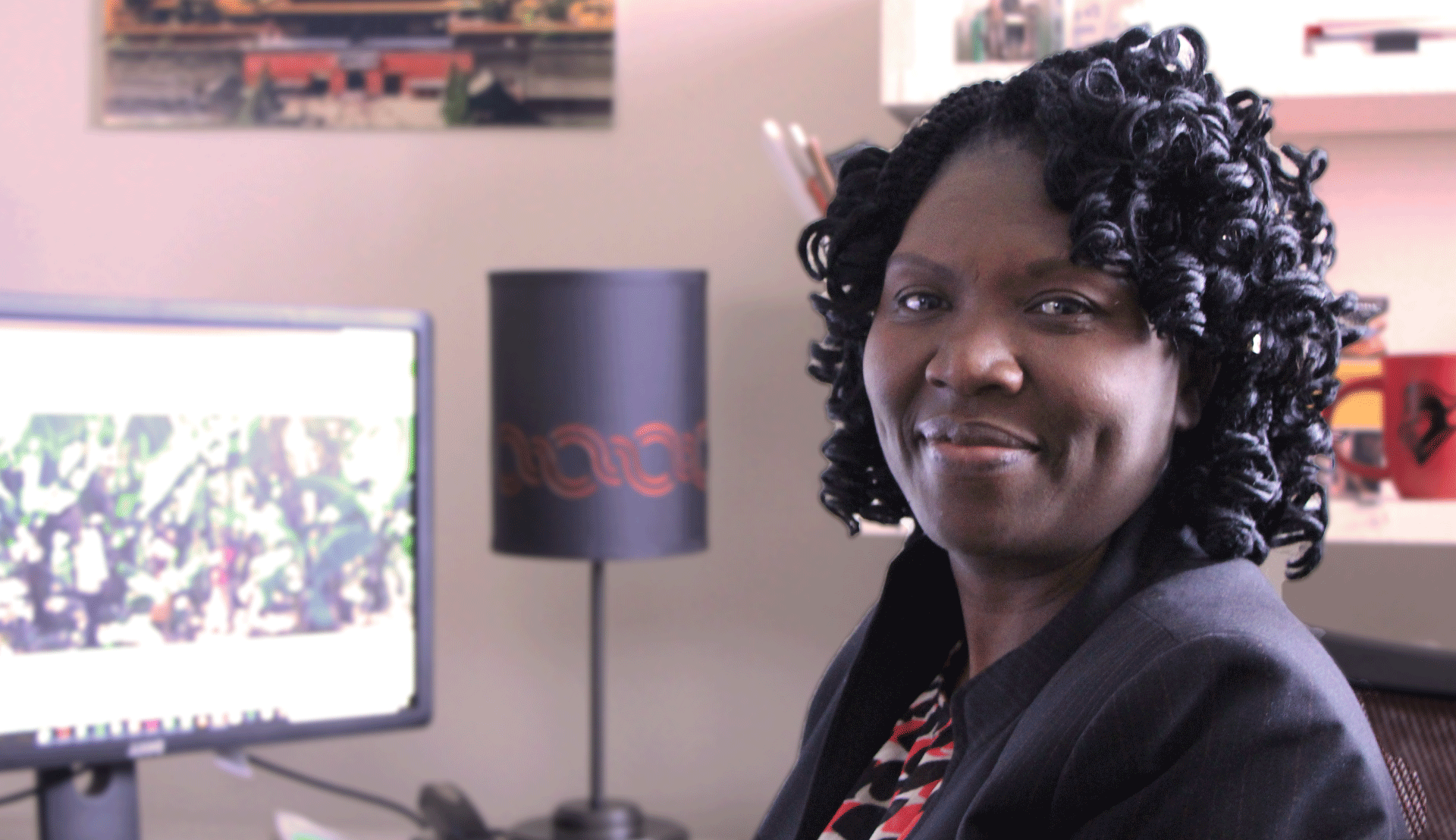Asenath Dande of Rutgers Global teams up with a 2017 Mandela Washington fellow from Kenya to help young women in her home country pursue and succeed in education.
“From seventh grade, these girls disappeared.”
Asenath Dande, associate director of international scholar and faculty services at Rutgers Global, grew up immersed in the education system. Her mother passed away when she was just five years old, and her father, a teacher, “pretty much raised me.”
Following her mother’s death, Dande and her father moved from Migori County, Kenya, to a remote village in Tanzania to teach, where Dande witnessed new rites of passage and cultural traditions involving girls, such as female circumcision.
“The girls never went to school,” she recalled. “They were teenagers, and they were getting married.”
When she moved back to Kenya as a teenager, Dande recalled losing touch with her female classmates after the age of 12 or 13, when many of them could not afford to continue their education or stopped attending school to tend to household matters.
“It bothered me,” Dande said. “My position at that time was that if they don’t go to school, they will end up on the streets. They will find someone who, for a little pocket change, will convince them to get married or persuade them to enter risky lifestyles where they will end up getting sick and die.”
 In the early 1990s, Dande traveled to the United States to pursue her graduate degree at St. Lawrence University, NY. However, as a student, Dande felt she didn’t have the resources to address the issue.
In the early 1990s, Dande traveled to the United States to pursue her graduate degree at St. Lawrence University, NY. However, as a student, Dande felt she didn’t have the resources to address the issue.
She returned to Kenya after receiving her master’s in education administration. Though a decade had passed, she realized that a new generation of females were encountering the same obstacles to education—a proverbial spark to the flame.
“It was sad. There were so many kids who were parentless; they had died of HIV. I had nieces who were not able to go to school. I started informally helping them to get an education—it was my passion. I sent school fees, made sure they had food,” said Dande. “And in 2012, it hit me.”
Dande soon realized that she could “formalize this and raise funds for these girls to go to school.” In 2012, she founded the Hitaji Development Initiative, a Kenyan NGO and registered 501(c)(3) nonprofit focused on empowering women and providing education, job training, and mentorship to school-age girls who cannot afford to attend classes.
Five years later, Dande spends her days busy with her work at Rutgers and nights and weekends as Hitaji’s CEO and founder. With a small administrative staff on the ground in Kenya, the NGO connects with key players and turns funding from generous donors to provide school uniforms, school supplies, and scholarships for tuition to girls in need.
“The first cohort of girls who received our scholarships graduated from high school in 2017,” said Dande.
Still, there are problematic trends Dande is looking to address.
“The girls are going to boarding schools where they have food, lights—and then breaks come, and this is not the case,” she said. “They basically become maids in the home—fetching water, firewood. Then, they go out and they interact with boys, and maybe are not in the safest environments. Then, they get themselves into some trouble in terms of sexual interactions.”
To combat this, Dande aims to start a mentorship program designed like a summer camp to keep them entertained with positive activities and focused on education to inspire them to stay in school. She will also be focusing on steering the girls towards studying science, technology, engineering and mathematics (STEM) fields.
“But it’s hard to implement this being long distance,” she said.
 Enter Victor Charo, a Kenyan healthcare worker with the Nuru Kenya Organization who came to Rutgers in 2017 as part of the Mandela Washington Fellowship, a flagship program of the Young African Leaders Initiative (YALI) facilitated by the Department of State and IREX. Charo was among a select group of up-and-coming sub-Saharan leaders chosen to come to the United States to participate in six-week training programs at designated U.S. host universities—Rutgers is among those host universities.
Enter Victor Charo, a Kenyan healthcare worker with the Nuru Kenya Organization who came to Rutgers in 2017 as part of the Mandela Washington Fellowship, a flagship program of the Young African Leaders Initiative (YALI) facilitated by the Department of State and IREX. Charo was among a select group of up-and-coming sub-Saharan leaders chosen to come to the United States to participate in six-week training programs at designated U.S. host universities—Rutgers is among those host universities.
Charo, who designs and implements healthcare interventions, to improve healthy behavior and reduce preventable maternal and child deaths among farmers in rural areas of Migori County, met Dande at a Mandela Washington Fellows networking reception during the first week of his fellowship at Rutgers.
“I applied to the fellowship because I wanted to ensure women and girls especially are empowered and educated in public health practice to improve their livelihoods, and I remember introducing myself to Dande and talking about what I do back at home,” Charo said. “We ended up exchanging contact information and talking about collaborating in promoting the health and socioeconomic well-being of women and girls in Migori County through the Hitaji Development Initiative.”
Charo has been instrumental in connecting the NGO staff with potential partners and volunteers. Until recently, however, their progress has been limited to Skype calls, emails, and other impersonal interactions—coupled with the obstacle of being in different time zones.
In 2017, IREX announced the Reciprocal Exchange Component of the Mandela Washington Fellowship, which allows American partners to travel to Africa to strengthen professional connections established with past fellows who visited the United States.
Charo and Dande applied for the award—and won. Dande joins Ronald Quincy, professor at the Bloustein School, as one of only two Rutgers recipients of the award.
As part of the award, Dande will travel to Migori County in June 2018 to meet with local schools and Rongo university administrators, school principals, teachers, parents, and other stakeholders to establish a summer mentorship program and train volunteer teachers to lead girls in the classroom.
“I want to also build on our vocational training, and I’m always open to ideas for new programs or how to improve our existing ones. I’d also like to expand to other counties,” she said.
Dande says that implementation of new ideas or improvements “comes down to the funds”—and, perhaps, her determination, dedication, and round-the-clock commitment.
“I’ll spend sleepless nights thinking of how to make things work for these girls.”
The 2018 Mandela Washington Fellows will arrive at Rutgers–New Brunswick in June 2018. For more information on the IREX Reciprocal Exchange Grant or opportunities to meet this year’s fellows, please contact Greg Costalas at gcostalas@global.rutgers.edu or Johanna Bernstein at johanna.bernstein@rutgers.edu

